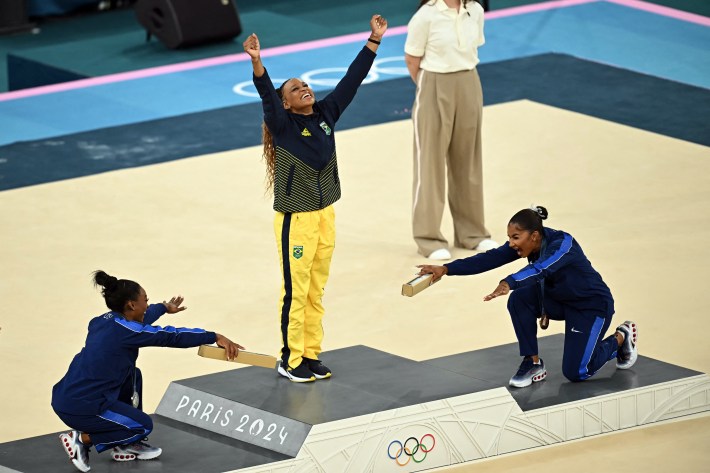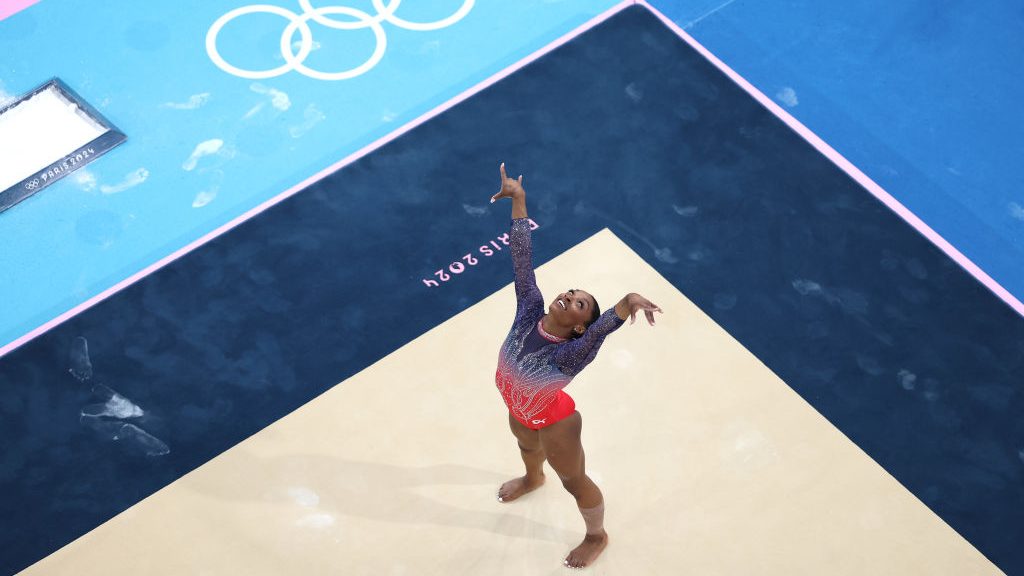PARIS — Simone Biles is not inevitable. No flesh-and-blood human could be. What she is, instead, is inescapable. It doesn't matter what country a person is from, or how in-depth they follow gymnastics, or if they even speak English. Her greatness as an athlete looms over almost all of us. That's why, when I went on a tour earlier this week about the hidden history of women's sports in France, her name came up, even though Biles is not French, even though she still had two more events to go. At the conclusion of our tour, the guide asked for each person to name a female athlete. Well before it got to me—the lone American in the group—someone said Biles. The entire group made sure to nod and say yes in agreement.
Biles is a black woman in a sport associated with a soft, quiet, and historically white femininity. She stars in one of the few sports in the United States where women are far more popular than their male counterparts, making it easy for a certain type of sports fan or writer to overlook how globally famous she is and how much she means to people, on top of what she's accomplished. Sports discourse, if you ingest enough of it, might convince you that Patrick Mahomes and Jayson Tatum are more important, accomplished, or famous than Biles.
This was Biles's résumé before Paris: seven Olympic medals, including four golds, the most decorated gymnast in World Championship and Olympic history coming in with a total of 37 medals, the same total as the entire Chinese men's gymnastics team. By the end, she had brought her Olympic medal total up to 11, putting her well past Shannon Miller for the most decorated Olympic gymnast in U.S. history. Biles's haul included three more golds, a return to the all-around podium, a history-smashing vault, and a silver medal on floor that resonated because of how she and teammate Jordan Chiles took the moment to honor the athlete who pushed Biles, while also making her own gymnastics history: Brazil's Rebeca Andrade.
All Olympics, Biles acknowledged how much she liked Andrade and how the Brazilian superstar's presence got her to raise her own game. But Biles has been dominating these Olympics, leading the U.S. to the team gold (while Brazil took bronze, the country's first-ever team medal in women's Olympic gymnastics), then taking gold again in the all-around (while Andrade took silver), then winning individual gold again on vault (while Andrade, again, took silver). So it was no surprise that, after Biles made two small mistakes in her floor routine Monday, Andrade finally nabbed a gold of her own.
Monday's competition began with balance beam. Each athlete would take to the beam but then, when people tried to cheer them on in the area, other people would shush them. This usually can't happen during a gymnastics meet because of all the floor music and general noise from other apparatuses, but with no floor music being played and only the beam competition happening, the silence won. It made for an odd event, as voices would call out, "Come on! You've got this!" followed by "Shhhhhhh!" I couldn't tell where the "Shhhhhhh!" came from, but even from my spot way up in the (relatively) cheap seats all the way on the other side of the arena, I could hear it. Suni Lee, competing a day after taking bronze on the uneven bars, later joked to the Associated Press that it was so quiet the photographers nearby might have been able to hear her breathing.
The end results of balance beam were a surprise. Lee, Biles, and several other gymnasts fell during their routines. Biles also received an extra deduction, a 0.3 penalty, for what, as best anyone could tell, was for not "properly" saluting the judges at the end of her performance. Neither Biles nor Lee medaled, and Andrade just missed out on the podium in fourth. This was hardly a result gymnastics fans could bemoan too much, though, as it meant Alice D’Amato took home the first-ever Olympic gymnastics gold for Italy.
Next came floor, which thankfully meant no more silence and shushing. The announcers in the arena even got the crowd warmed up by playing a little horn music, followed by about 15,000 people screaming "Allez!" It seemed everyone had been in France long enough to have picked up a little French.
Biles's biggest problem, if you can call it that, is she has so much power that she'll bounce out of bounds during her floor routine. In perfection- and boundary-obsessed gymnastics, this can lead to deductions. Biles bounced out of bounds twice during her floor routine on Monday, and it left enough room for Andrade, who delivered a stunning series of tumbling passes that the crowd adored, to snag gold. Chiles, a quintessential UCLA Bruin gymnast who cannot help but win over any crowd, closed out the competition and, eventually, took bronze. When the result became clear, Chiles burst into tears and jumped up and down, soon joined by Biles, her longtime friend and teammate.
(In the arena, they showed Chiles's provisional score, which was a bit below that of Romania's Ana Barbosu. But a score inquiry—which is allowed—led to a new, higher score for Chiles, one that put her in third. It led to some confusion in the arena, followed by one of the announcers clarifying that the first scores shown are always provisional.)
When the medal ceremony began, Chiles and Biles both bowed to Andrade.

What the photo doesn't show is that, inside the arena, hundreds of Brazilian fans were losing their damn minds. They waved flags. They hoisted signs. They chanted "Re-Be-Ca!" for their champion, who grew up in a favela, one of eight children, and became the force that helped guide Brazil to it's historic team bronze. She even wears glasses, just like another gymnast you might have heard of these Olympics.
Brazilians have been out in huge numbers in Paris for their gymnastics team, clad in their iconic yellow and green, but all Olympics their anthem had not played in this sport. For it to end with them screaming for Andrade, with Biles and Chiles saluting her, just felt right. Only a fool would doubt Biles's greatness, so why not share in the joy of the first Olympic podium in women's gymnastics history to feature three black gymnasts? It might not have been the ending people envisioned going into Monday's competition, but it more than met the moment. Biles later told reporters the bow was Chiles's suggestion, and she replied by saying, "Absolutely."
And then it was lights up in the arena and back to reality, minus the stragglers who stayed behind to wave the stars-and-stripes for Biles and Chiles while they did their TV interviews. Walking out of the stadium, Romania fans aside, it was mostly joy. People saw Chiles's parents, Timothy and Gina, and not only told them congratulations, but gave high-fives and asked for selfies. (They said yes to the requests.) A gaggle of women clad in U-S-A clothing talked about how great they were feeling. A pair of little girls in red-white-and-blue tutus with silver stars walked by. A great time was had by all (again, unless you were Romanian).
"I have accomplished way more than my wildest dreams, not just at this Olympics but in the sport. So I can't be mad at my performances," Biles said afterward. "A couple years ago, I didn't think I'd be back here at an Olympic Games. So competing and then walking away with four medals, I'm not mad about it. I'm pretty proud of myself."
Three years after Biles had to pull out of Olympic competition in Tokyo with the twisties, she came back performing stronger than ever. She won by comfortable margins. She smiled. She talked to the press and gave entertaining and charming answers. She shouted out her teammates and shared the spotlight with them. She seemed just as happy when her teammates won as she did for herself. Perhaps most importantly, she looked like she was having fun.
She also got saucy. She sparred online with former Tokyo teammate MyKayla Skinner, who posted video online in which she claimed the U.S. team didn't "have the work ethic" and blamed SafeSport, the organization charged with trying to stop sexual abuse in U.S. sports. Biles responded, noting “not everyone needs a mic and a platform.” Skinner apologized. But Biles did not forget. When the women won team gold, Biles posted photos on Instagram of them celebrating with the caption “lack of talent, lazy, Olympic champions”—a reference to Skinner’s own words. It shocked because, in a sport obsessed with femininity and code words like grace, elegance, effortlessness, Biles was reveling in being the GOAT. Like Michael Jordan before her, she heard comments from an athlete who is fathoms below her, and decided to take it personally.
All week, Biles's teammates seemed to be taking cues from how much fun she was having. The post-win press conference after the team all-around was downright giddy, with the women referring to themselves as team Fuck Around And Find Out before later settling on the Golden Girls, a sly reference to their “gymnastics old” average age of 22. It was a far cry from the dainty, soft-voiced, and overly humble girls of gymnastics prior. These were grown women feeling themselves.
That energy carried over to the individual all-around competition, where Biles took home gold again and Lee snagged a bronze. It put both women in rarified air; Biles was the first woman to win two all-around Olympic gold medals since the 1960s. Lee added to her own impressive medal total; she is now the third-most decorated American in women's Olympic gymnastics. Afterward, both celebrated with a giant U.S. flag and Biles flashed a silver goat necklace that sparkled almost as much as her leotard. With Jade Carey winning a bronze on vault, Lee's bronzes in the all-around and uneven bars, and Chiles's bronze on the floor, every woman who returned from Tokyo had both a team gold and at least one individual medal. They didn't need redemption, but they sure put to rest any doubts about their greatness.
There is no more to want from Biles. She has won all the medals, broken all the records, and pushed the sport into a new age. She delivered performance after performance after performance. When she did falter, she took the opportunity to acknowledge a more than worthy rival. Anyone can be gracious when they win. Few people have enough access to their own humanity to share the stage, or even concede it, when another has bested them.
And that's why what's best about Biles isn't what she accomplished alone. So she broke some records; some day, hers too shall fall, as every athlete knows. What will stand the test of time is what she and this entire generation of female gymnasts accomplished together. They spoke out against sexual, mental, and physical abuse in their sport. They took on their federations. They dismantled the idea that a female gymnast was "too old" by age 18. They shattered one of the hallmark values of gymnastics itself—perfection—by mastering skills so difficult that stepping out of bounds didn't mean the end of everything. They were loud. They had opinions. They weren't flawless. They carved out space for female gymnasts, for all women, to be a little less perfect, to step outside our pretty boxes, to be human—and still be golden.






